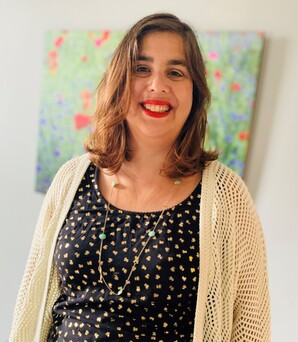Caroline Gauchotte-Lindsay
ECG Bulletin January 2021
Dr Caroline Gauchotte-Lindsay is a Senior Lecturer in Water and Environmental Engineering at the University of Glasgow. She specialises in developing novel analytical solutions to monitor and remediate pollutants.
|
What inspired you to become a scientist?
When I was 12, I took a keen interest in genetics; one day, I read about its use in forensic science in the kids’ science magazine my granddad had bought me a subscription for. It was the very beginning of the use of DNA in police investigations in France. From then, I decided I wanted to be a forensic scientist (this was before CSI!) and it guided my choices in the subjects I studied. How did you come to specialise in environmental analytical chemistry? On my way to becoming a forensic scientist, I discovered analytical chemistry. I realised that chemistry was even more exciting to me than biology (my Cartesian side, I suppose), and so pursued my postgrad education in analytical chemistry. During my PhD, I joined a civil engineering department where I got hooked on environmental forensics (attributing contamination events to their polluters). The environmental dimension involved much more complex matrices, and to me that brought exciting challenges. |
Could you describe your current job?
I am a lecturer and a researcher in the James Watt School of Engineering at the University of Glasgow. I teach chemistry and environmental engineering to civil engineering students, which is a great challenge! I also have a diverse and talented research group. We investigate new ways of measuring organic compounds in many environmental matrices by combining advanced analytical methods with machine learning. Finally, I also do citizenship work for the University and the wider community, mostly around gender equality in STEM subjects.
What advice would you give to anyone considering a career in environmental chemistry?
Do it: we need you! I would also advise you to cultivate a taste for interdisciplinarity. The environment is complex, and chemistry must team up with numerous other fields to tackle it.
What are some of the challenges facing the environmental chemistry community?
The main challenge for me is that some of the issues we tackle as environmental scientists have become urgent: climate, water scarcity, atmospheric pollution. We need to act fast but also smart, and sometimes the two don’t go together well. We also must keep advocating for all issues, even when the general public focus is on “pet” issues such as plastic pollution.
What is the most rewarding aspect of your career so far?
I wouldn’t work in academia anymore if it wasn’t for the most rewarding part of my job: enabling others in their careers. Undergraduates graduating, PhD students defending their hard work, postdoctoral researchers moving on to permanent jobs – this is what keeps me going.
If you weren’t a scientist what would you do?
Good question! I have multiple interests; science was never the only option. Back when I was a teenager, plan B was to be a high fashion stylist. Now I think I would want a job where I can directly impact people’s quality of life, maybe a politician or a midwife!
And what do you do when you are not working?
Nowadays, mostly being a maman to my little girl, although now that she is a little bit older, I am also back to hiking in the Scottish hills – now with her. I also do crochet and cross-stitching, and I am currently learning Italian.
I am a lecturer and a researcher in the James Watt School of Engineering at the University of Glasgow. I teach chemistry and environmental engineering to civil engineering students, which is a great challenge! I also have a diverse and talented research group. We investigate new ways of measuring organic compounds in many environmental matrices by combining advanced analytical methods with machine learning. Finally, I also do citizenship work for the University and the wider community, mostly around gender equality in STEM subjects.
What advice would you give to anyone considering a career in environmental chemistry?
Do it: we need you! I would also advise you to cultivate a taste for interdisciplinarity. The environment is complex, and chemistry must team up with numerous other fields to tackle it.
What are some of the challenges facing the environmental chemistry community?
The main challenge for me is that some of the issues we tackle as environmental scientists have become urgent: climate, water scarcity, atmospheric pollution. We need to act fast but also smart, and sometimes the two don’t go together well. We also must keep advocating for all issues, even when the general public focus is on “pet” issues such as plastic pollution.
What is the most rewarding aspect of your career so far?
I wouldn’t work in academia anymore if it wasn’t for the most rewarding part of my job: enabling others in their careers. Undergraduates graduating, PhD students defending their hard work, postdoctoral researchers moving on to permanent jobs – this is what keeps me going.
If you weren’t a scientist what would you do?
Good question! I have multiple interests; science was never the only option. Back when I was a teenager, plan B was to be a high fashion stylist. Now I think I would want a job where I can directly impact people’s quality of life, maybe a politician or a midwife!
And what do you do when you are not working?
Nowadays, mostly being a maman to my little girl, although now that she is a little bit older, I am also back to hiking in the Scottish hills – now with her. I also do crochet and cross-stitching, and I am currently learning Italian.


